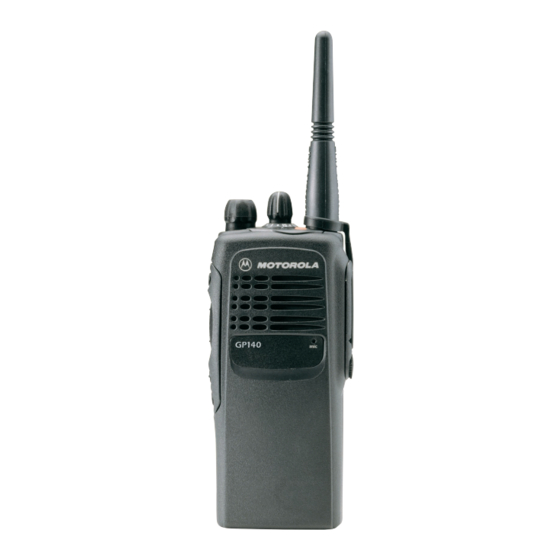Motorola GP240 Manual del usuario - Página 11
Navegue en línea o descargue pdf Manual del usuario para Radio Motorola GP240. Motorola GP240 46 páginas. Professional radio, power distribution and controller
También para Motorola GP240: Información de servicio (32 páginas), Información de servicio (30 páginas), Manual del usuario (46 páginas), Información de servicio (30 páginas)

Menu Keys (GP280 radios only)
Softkey 1
Softkey 2
l ; l
,
.
Home
Left
Selecting a Feature
A unique feature of your radio is its use of the display
to give you quick access to many of the radio's
features without having to have a dedicated key for
each feature.
The names of the features (CALL, MUTE, etc.) are
shown on the display, three at a time. Selection of
features is controlled by the three keys directly below
the feature names: the left key controls the left feature,
the middle key controls the middle feature, and the
right key controls the right feature.
Softkeys (l;l)
When already in Menu Mode, these keys are used to
make Menu selections.
Left and Right Arrow Keys (,/)
Softkey 3
The left and right arrow keys are used to scroll the
display forward or backward through the radio's
features and lists. There is no end point to the list, so if
you continue to scroll in one direction, the display will
"wrap around" back to the beginning of the list. If you
/
hold either key down, the display will scroll at a faster
rate until the key is released.
The left arrow key is also used for editing when you
Right
are entering information manually from the keypad.
Pressing the left arrow key, when editing numeric
information (such as telephone numbers), will
backspace, and erase the display, one character at a
time. If you have erased all the digits, an additional
press of the left arrow key will return the display to the
pre-programmed list.
Pressing the left arrow key, when editing alphabetic
information (such as member's names), will move the
cursor one step to the left.
HOME Key (.)
The HOME key will always return you to the home
(default) display. In most cases, this is the current
mode. In addition, if you are using a feature that
requires it, pressing the HOME key will also cause
information to be saved in memory before going to the
home display. Some radio features will automatically
go to the home display when they are completed,
English
7
